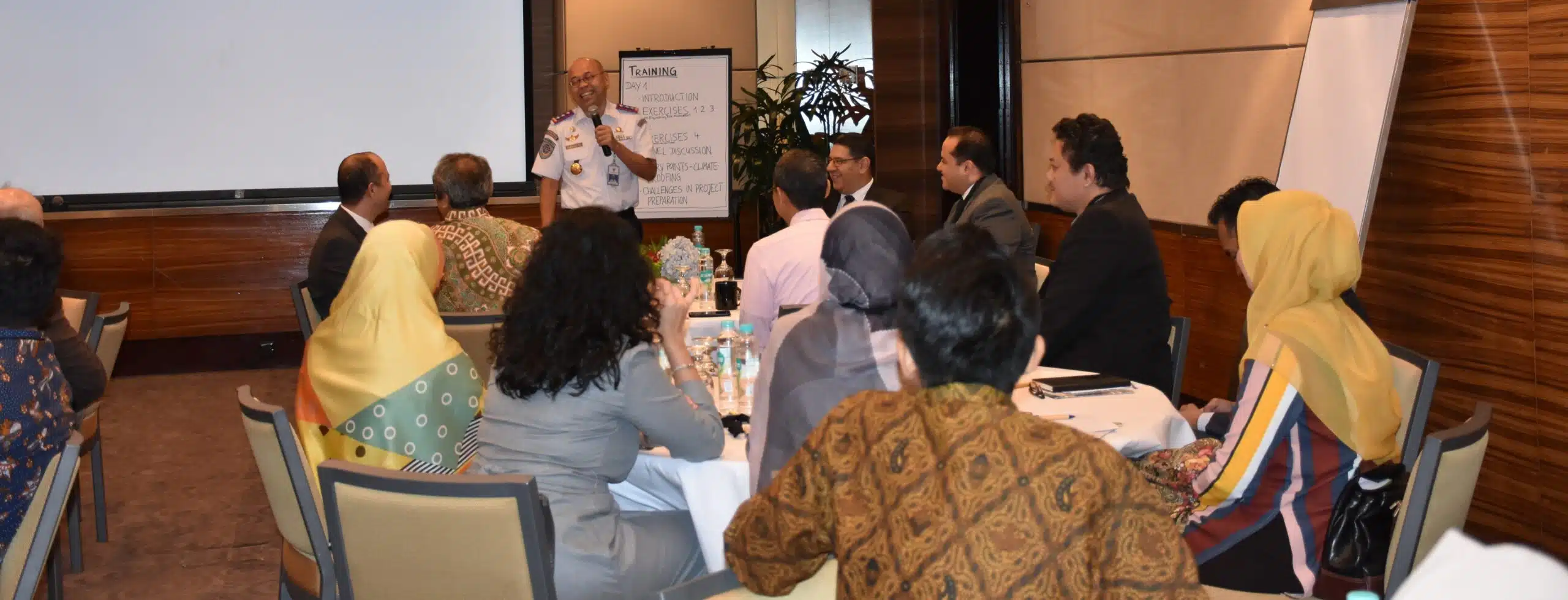By Levent Toprak
The Islamic Development Bank (IsDB) and GIZ jointly organized their ninth training in Jakarta, Indonesia from 07.- 08. November. More than 30 decision makers and planners of municipal transport systems and representatives for economic development and foreign investments from Islamic Development Bank member countries Maldives, Bangladesh, Malaysia and Indonesia engaged in finding the right approaches and tools to plan climate resilient urban transport in the training in Jakarta, Indonesia.
The two day training started with the welcoming remarks from the hosts Mr. Ibrahim Ali Shoukry, Head of IsDB Regional Hub Indonesia, Mr. Petrus from the Ministry of National Development Planning, Indonesia (BAPPENAS) and Mr. Levent Toprak from the Transformative Urban Mobility Initiative (TUMI). After that, Mr. Bambang Prihartono from the Greater Jakarta Transportation Agency (BPTJ) set up the scene and introduced the transportation plan for Jakarta. Considering the ambitious plan, the Indonesian capital of Jakarta was the best place to hold a training on climate resilient urban transport: Jakarta is one of the fastest-sinking cities in the world. North Jakarta for instance is sinking by about 25 cm every year. Researcher say, parts of the megacity could be entirely submerged by 2050. For Indonesia, as well as for Maldives, Malaysia and Bangladesh, climate change is an issue of highest urgency. Besides ambitious planning, knowledge for climate resilient urban transport planning is highly necessary.
The training
The major objective of the two-day training course has been to raise the awareness of the participants from IsDB member states about:
- climate change impacts on urban infrastructure;
- possible methods and approaches towards assessing asset specific climate risks;
- approaches towards options and entry points on managing climate risks, as well as integrating climate risk assessment procedures into infrastructure investment planning.
The core of the training followed the Harvard Case Method, where the contents of training is experienced through the simulation of a fictitious case study that has similarities with the real world conditions of the participants. This way, participants have the opportunity to engage in learning by making their own experiences. The training followed the sequence of input presentations, exercises in group work and reflection phases in plenary. Training materials included case study descriptions as well as tailor made instructions for specific actor groups as guidance for group work.
Our trainers were Dr. Niklas Baumert from GIZ Headquarters Germany, CSI Project (Climate Services for Infrastructure Investments), Ms. Urda Eichhorst from GIZ Headquarters Germany and Mr. Quentin Chiotti from Metrolinx Canada.
Outcomes of the training
The training has enhanced the understanding that transport infrastructure is at risk due to climate change. Participants went through all steps of climate risk management (based on the PIEVC risk assessment method owned by Engineers Canada) taking a bridge and its components as example, including the following steps:
- Choosing the infrastructure asset and selecting its respective components subject to risk assessment;
- developing a risk matrix for each of them, that inherits a metric for the calculation of future climate change probability of climate events affecting the asset
- defining and calculating anticipated consequences,
- elaborating and selecting climate risk management options;
- defining which risk management options need to be mainstreamed into what type of policy, sector, strategy, or e.g. asset management plan.
In the end, all working groups have developed their own climate risk management results that have been discussed in a comparative manner. Participants had to tailor climate information to the sensitivities of infrastructure asset components, hence experiencing the role that climate services are playing in climate risk management.
Participants have learned that generic methods for climate risk assessment exist, such as the PIEVC method in ownership of Engineers Canada, but that country specific approaches need to be developed and adopted once climate risk management becomes an integral part of climate resilient infrastructure planning.
Moreover, they have understood that managing climate risks in large urban settings can only be accomplished in a multi-sectoral and collaborative effort of stakeholders representing different disciplines and sectors. Hence, it got clear, that risk management is a multi-stakeholder process that needs to be governed. Those facilitating such processes of climate risk management must own extraordinary inter-disciplinary skills, in which stakeholder management and knowledge brokerage is key.
Looking at the evaluation of the training, participants seemed to like the training approach and outcomes. Now, the challenge is how participants will use the new learnings in their professional work. The competence level attained through this training is awareness and the ability to stimulate debates about the topic. However, the ability to apply the knowledge and become a crucial change agent towards more resilient urban infrastructure requires more substantial capacity development. On behalf of the Federal Ministry for Economic Cooperation and Development and the Transformative Urban Mobility Initiative (TUMI) GIZ will continue the partnership with the IsDB to bring together transport experts and to support them in their efforts in making transport systems more sustainable in 2019.
You can find more information regarding the TUMI Capacity Development program. For further details regarding the partnership in transport with the IsDB please see our brochure.
Listen to Quentin Chiotti from Metrolinx about the importance of climateproof urban infrastructure:
https://twitter.com/Levent_bln/status/1059805358808489985
Contact: Levent Toprak, Levent.Toprak@giz.de
Introduction to the CSI Project
You are currently viewing a placeholder content from YouTube. To access the actual content, click the button below. Please note that doing so will share data with third-party providers.
